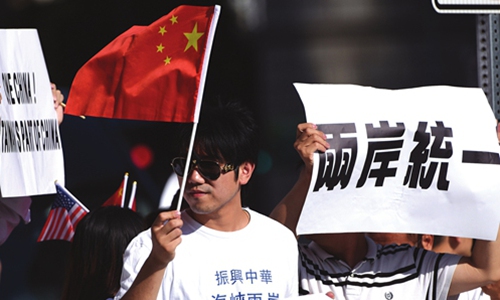US and Taiwan cannot afford starting new game over Taiwan question: Global Times editorial
Source:Global Times Published: 2020/5/20 10:02:11

A Chinese community in Los Angeles calls for reunification and protests Taiwan leader Tsai Ing-wen making a stopover in the US in August 2018. Photo: cnsphoto
US Secretary of State Mike Pompeo sent a congratulatory message to Taiwan regional leader Tsai Ing-wen on the eve of May 20 congratulating her on the commencement of second term in office. He called Tsai Ing-wen "President" and praised Taiwan as a highly reliable partner. It was the first time in recent decades that a US Secretary of State has publicly congratulated a Taiwanese leader on the start of her term.
Pompeo is clearly doing it to challenge Beijing. Yes, we see the US government moving backwards on the Taiwan question trying to challenge Beijing's bottom line on this question in a "salami slicing" approach. At the same time, it is intended to provoke the Chinese mainland, throwing out cards one by one as a game with Beijing.
The Chinese mainland is very sober. We won't get carried away by Washington's moves, and new arrangement regarding game over Taiwan question will be made. We will firmly grasp the strategic initiative of the situation in this region and finally smash all attempts by the US and Taiwan.
Beijing cannot control what Washington politicians speak. When the US politicians speak in accordance with the old rules of Sino-US relations, it is a scenario of Sino-US relations and the situation across the Taiwan Strait, with which Beijing interacts. When Washington breaks that rule, Sino-US relations and the situation across the Taiwan Strait are in flux, and we naturally adjust our response and play our cards.
Washington and the Tsai administration are so narcissistic that they think they can make the mainland uncomfortable and have nothing to do by saying a few words. After the traditional interaction between China and the US on the Taiwan question has been broken, the future will be up to the two sides. Who will suffer more next? It is hard to say.
What ultimately determines the direction of the situation across the Taiwan Strait is a contest of strength. The mainland's military strength has been able to effectively overwhelm the Taiwan military and deter the US military. The economic power between the two sides of the Taiwan Strait is tilted toward the mainland. This is the broad outline of the situation across the Taiwan Strait.
The one-China principle is widely recognized internationally, and it is one of the cornerstones of the current world order. Beijing's ability to mobilize resources from the international community will be greater than that of the US and Taiwan when they collide with the Chinese mainland to break and defend the one-china principle. Washington being snubbed at bringing Taiwan to the WHA is a clear illustration of this.
Beijing does not need to react directly to Pompeo's call to congratulate Tsai Ing-wen on her second term, but we need to take note.
The diplomatic landscape could end up like this: Taiwan's allies will be cut to zero, and only Washington is likely to give it some preferential treatment. But this preferential treatment, if it violates the Anti-Secession law, this would mean the end of all previous games on Taiwan question overnight.
China is becoming more powerful, and our ability to claim sovereignty over Taiwan is certainly growing. At this time, the US and Taiwan want to play petty tricks at a low cost, which is too naive. We will make them feel pain in some places that they can't think of.
Posted in: EDITORIAL